Twenty UMF education majors present their innovative teaching methods at the 2019 Association of Computer Technology Educators of Maine conference.
By Marc Glass and Ryan Mastrangelo
“While we teach, we learn,” said the Roman philosopher Seneca.
It’s a maxim 20 UMF education majors put into practice in early October when they made good on an invitation to present their technology-integrated learning activities and assessments at the 2019 Association of Computer Technology Educators of Maine conference in Augusta.
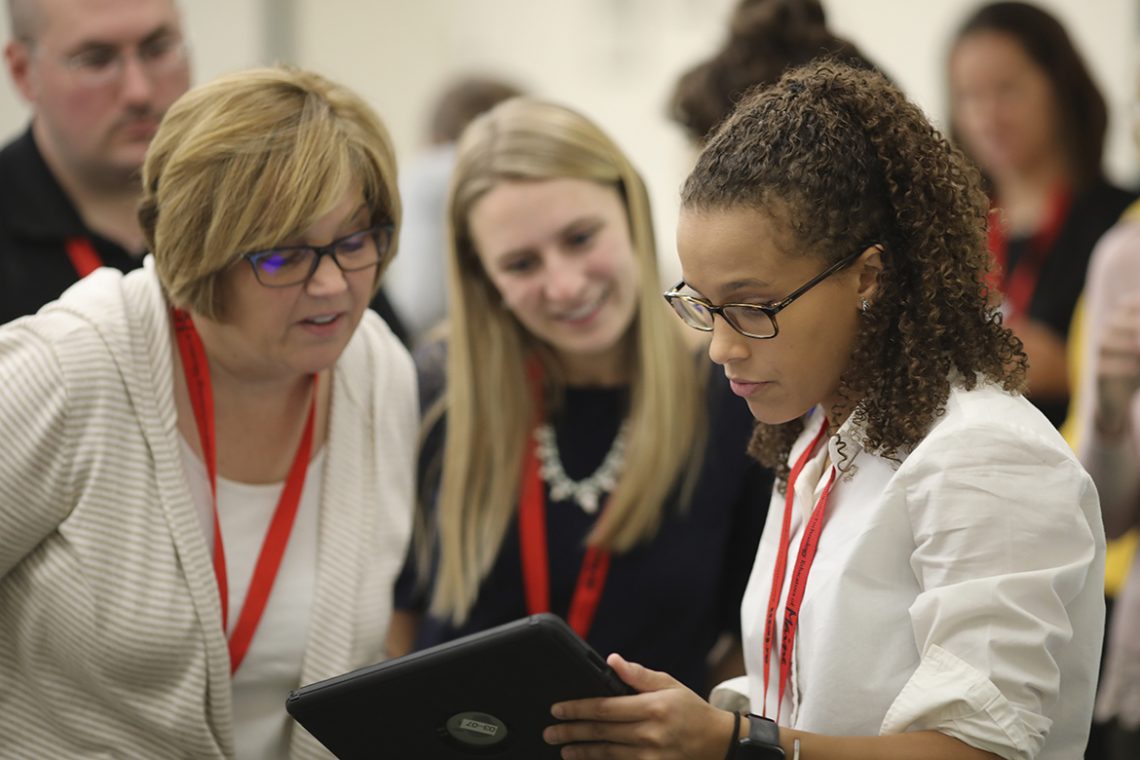
Sophie Hendrix ’21 (right) of Gorham, Maine, demonstrates for K–8 educators the connections between writing and visual coding when students create and present stories using Spheros. (Photo by Marc Glass.)
And as much of an honor as it is for the students in classes taught by Associate Professor of Secondary Education Theresa Overall, Assistant Professor of Elementary Education Meredith Swallow, and Assistant Professor of Literacy Education Kathryn Will-Dubyak to present at this year’s ACTEM conference, they’re hardly outliers.
“This is the 13th consecutive semester for UMF Secondary Education, School Health, and World Language practicum students to be presenting at a regional or statewide professional development conference,” says Overall.
On Thursday, Oct. 10, Swallow and Will-Dubyak’s students kicked off the two-day conference with a session on individual literacy and computational thinking projects titled “Interactive Storytelling with Spheros and Scratch.” For the uninitiated, Spheros are ball-shaped robotic toys whose movements can be directed with basic computer coding commands or swipes on a computer tablet. And Scratch is a visual programming language that children and adults can use to create interactive stories, games, and animations.
Combine the two with literacy activities, for instance, and children can express their knowledge in interactive ways that reinforce reading comprehension and creativity, as well as understanding of syntax and logical-sequential thinking. The integration of the two technologies also offers children opportunities to experience a greater sense of agency in the learning process, by making animations and the Spheros come to life. And when children experience agency, they are much more likely to feel and be engaged.
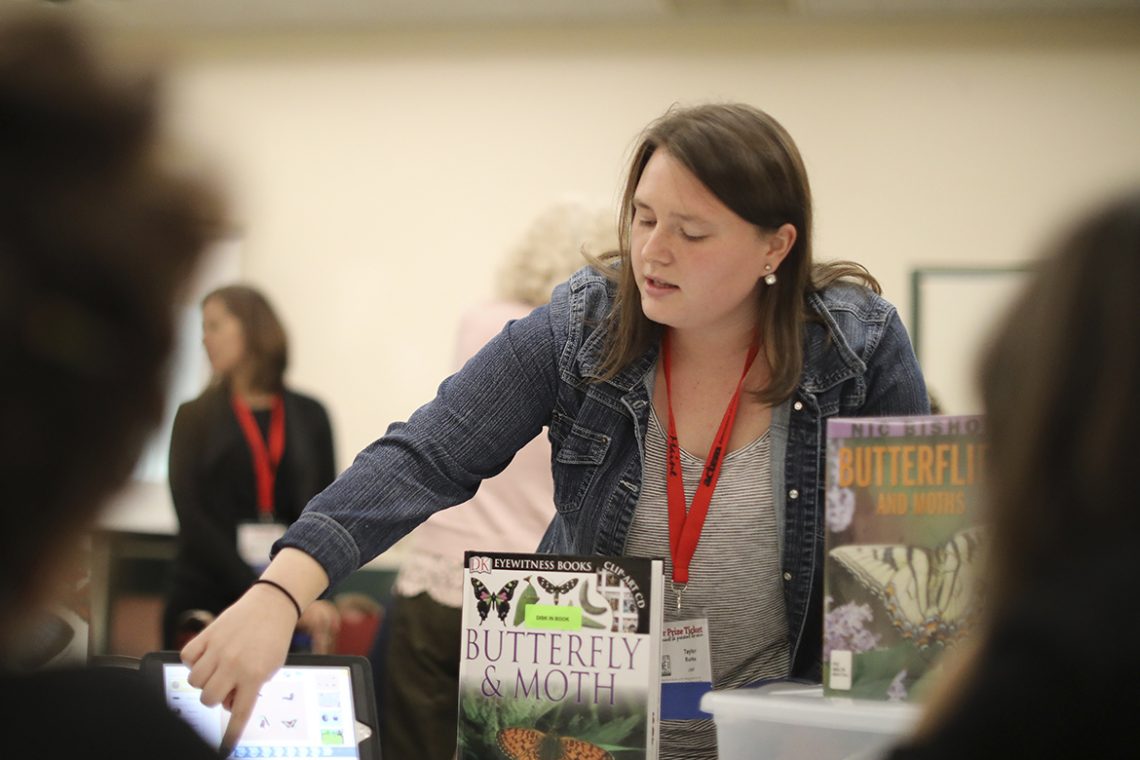
In her small-group session, Taylor Burke ’21 of New Sharon, Maine, showed conference attendees a learning activity she devised in which children can be taught to research the lifecycle of a butterfly and then create a script with Scratch to animate their findings. (Photo by Marc Glass.)
The integration of Scratch in the learning activity, “allows students to use technology as a tool, while also allowing them to play and discover new things on their own,” says junior elementary education major Taylor Burke. “My hope is to bring technology awareness and access to my students — to show them there are meaningful ways to use technology. It’s not all just videogames.”
Swallow and Will-Dubyak, who helped deliver introductory remarks for the session and then let their students do the talking, say the opportunity to present provides students with a “scaffolding experience” on their journey to becoming practitioners.
“We have seen evidence that students who have attended and presented at conferences with us have felt more comfortable participating in professional opportunities, as well as encouraging peers to get involved,” says Swallow.
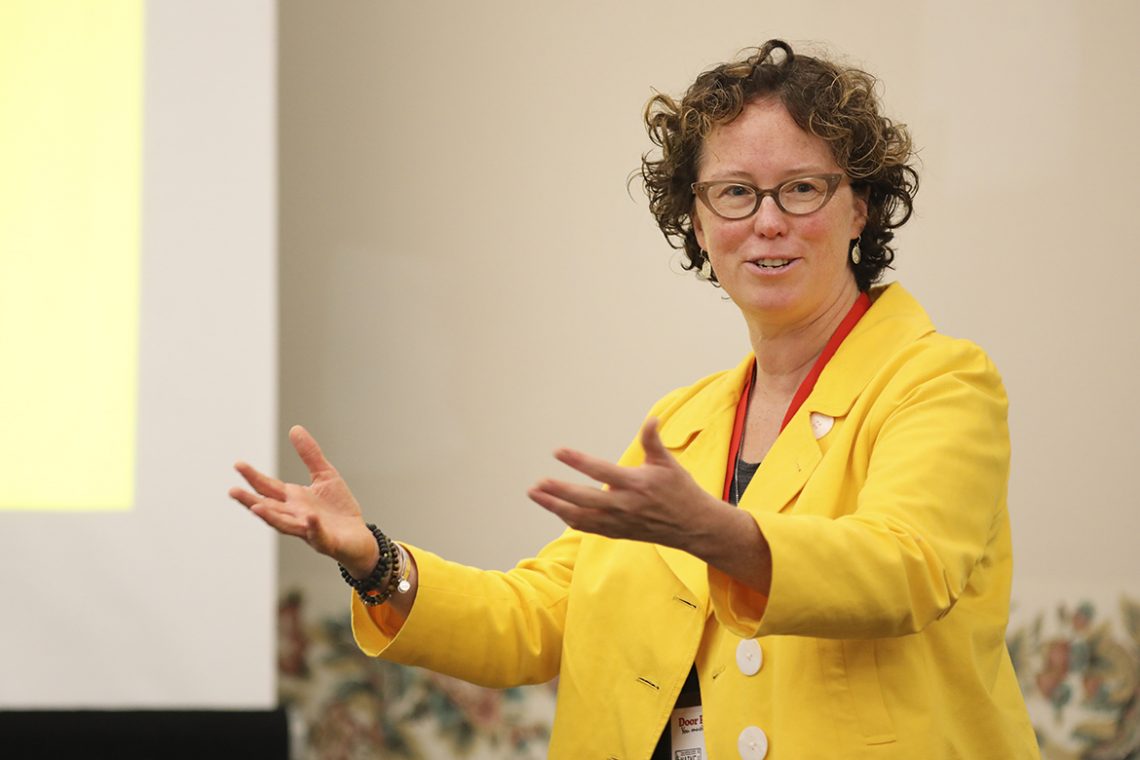
Assistant Professor of Literacy Education Kathryn Will-Dubyak helps set the stage for the day-one presentation “Interactive Storytelling with Spheros and Scratch.” (Photo by Marc Glass.)
“The experience also gives them the opportunity to make connections with the professional communities where they may eventually teach. Many of the attendees may be future mentors and colleagues,” says Will-Dubyak.
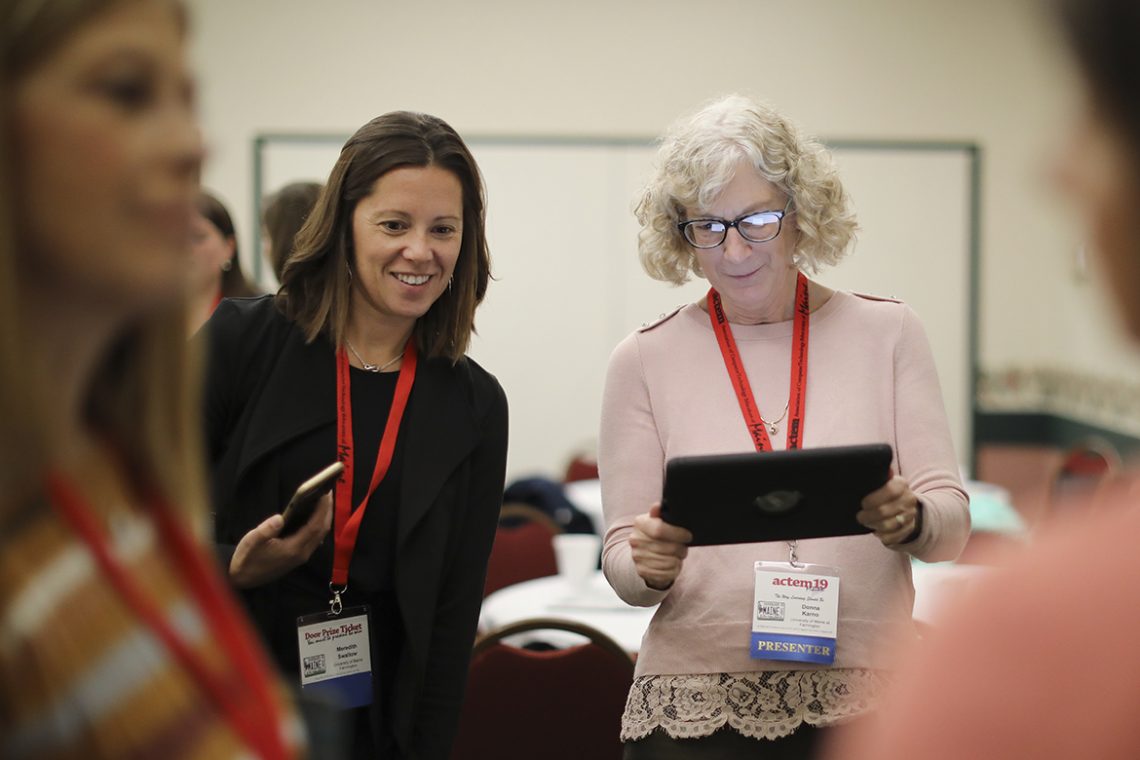
Assistant Professor of Elementary Education Meredith Swallow (left) and Associate Professor of Early Childhood Education Donna Karno try their hand at animating a Sphero via commands made on a computer tablet. “Less than 50 percent of early education teachers are currently using technology in their classrooms, in part because of the stigma associated with screen time and children and in part because of their discomfort and lack of knowledge with setting programs ups,” says Karno, who delivered her own presentation at ACTEM. “It’s important to get teachers started early — as we are doing here — and get them into classrooms so they can become mentors to other teachers.” (Photo by Marc Glass.)
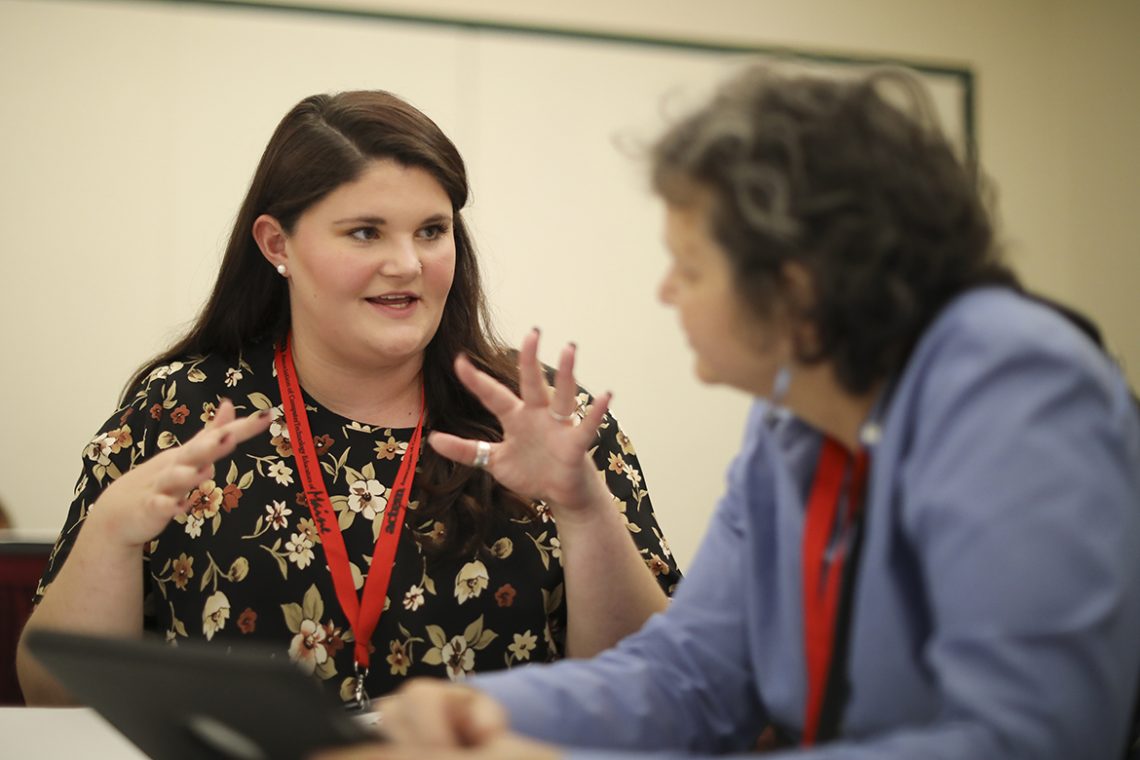
Morgan Wellman ’20 of Vassalboro, Maine, presented on using the programming language Scratch to compare and contrast paired text and create an alternative version of a fairy tale through the use of visual coding. (Photo by Marc Glass.)
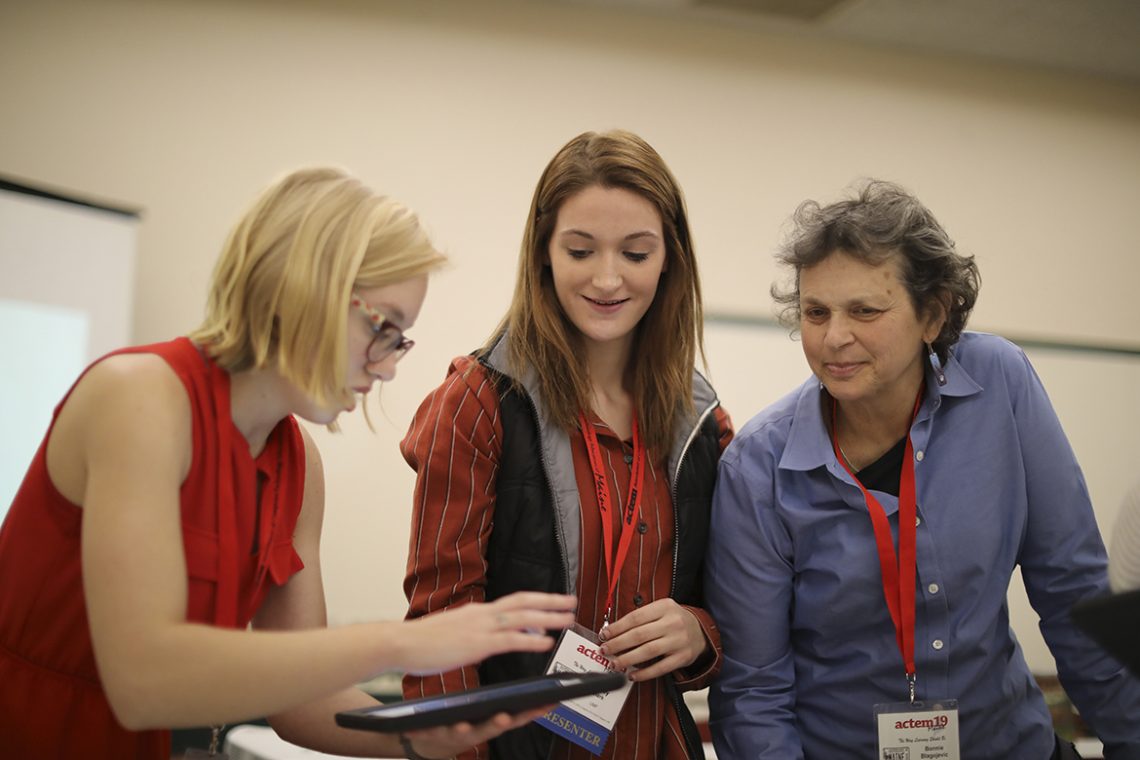
Paige Dutterer ’21 of York, Maine, (left) and her partner Ashley Clark ’21 of Greenwood, Maine, (center) presented on how students can use Scratch to guide a Sphero robot through a maze. (Photo by Marc Glass.)
Prior to delivering their presentations on day two of the ACTEM conference, Overall’s students tested their readiness by conducting a practice delivery for fellow education majors and members of the UMF community. After spending much of the semester learning how to design learning units that include curriculum, instruction, assessment, and technology integration, their presentations focused on technology-based assessments and productivity tools for units they designed in their individual concentration areas — English, mathematics, social studies, science, and world languages.
Ben Stoll ’22, a secondary education–English and creative writing double major from Milton, Vt., demonstrated how students can develop nonfiction narratives based on images they select from the camera roll on their smartphones.
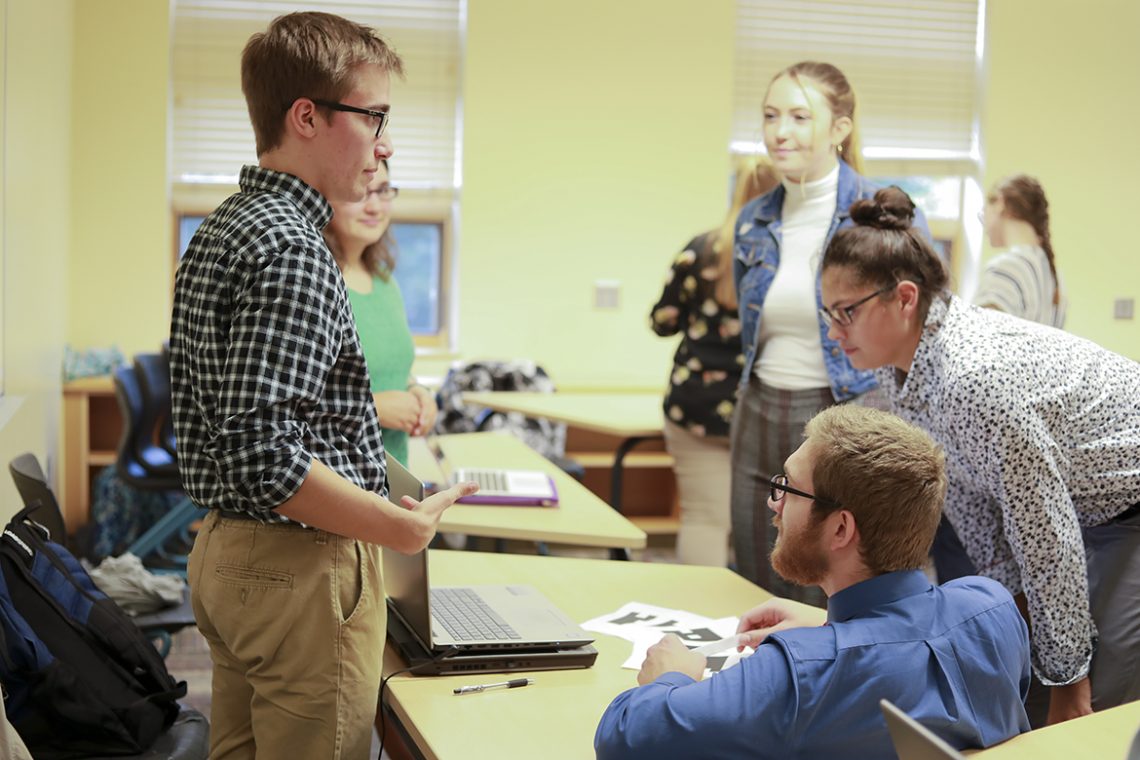
Ben Stoll ’22 of Milton, Vt., (left) shares his presentation with peers at a pre-conference practice session held in the Kalikow Education Center. (Photo by Ryan Mastrangelo.)
Stoll says he considers presenting his unit at the ACTEM conference to be a “big step” in his growth as an educator.
“Sharing my ideas with teachers looking to implement technology into their classrooms felt like important work, as I was helping practitioners who wanted to better the educational experience for their students,” he says. “It was a great way to develop myself as a teacher to be, and I am grateful for the experience.”
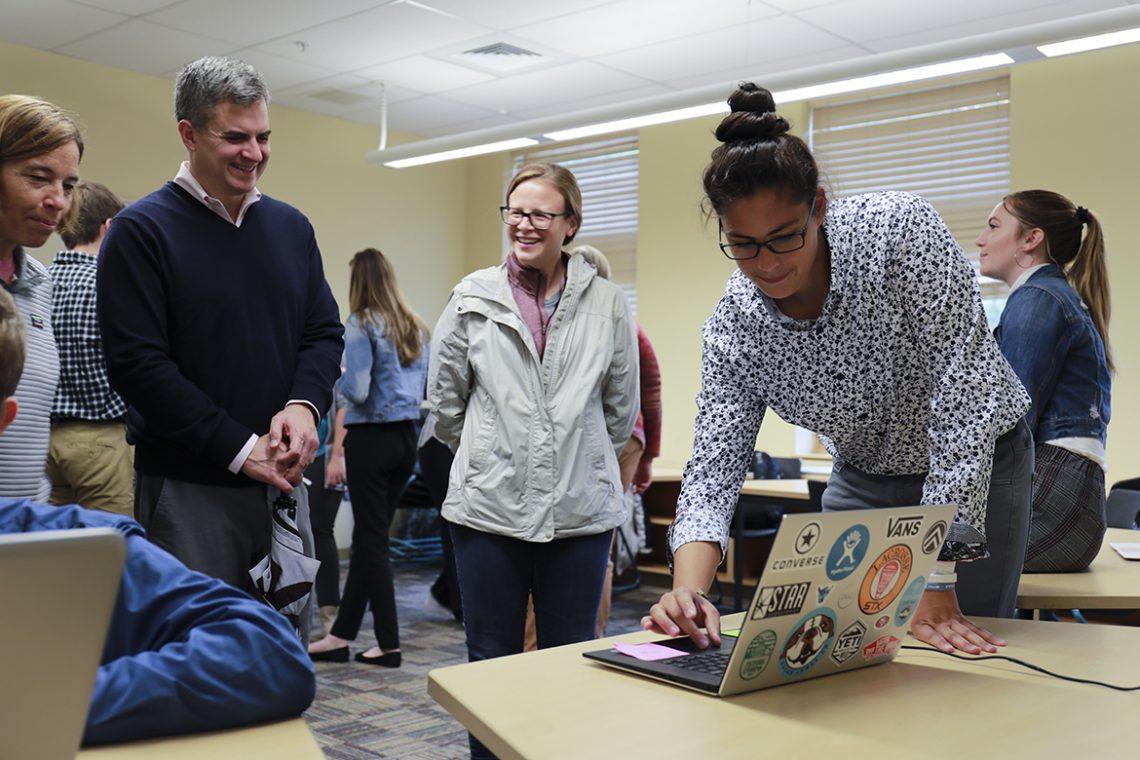
Lydia Wasina ’21 (right), a mathematics and secondary education–mathematics double major from Waterboro, Maine, shares her conference presentation with (from left) UMF Field Hockey Head Coach Cyndi Pratt, President Edward Serna, and Women’s Lacrosse Head Coach Bethany Lebel ’14. (Photo by Ryan Mastrangelo.)
For a unit she created on linear, quadratic and exponential models, Lydia Wasina ’21, a mathematics and secondary education–mathematics double major from Waterboro, Maine, delivered a presentation that a high school algebra student could create on how to compare revenue generated by two businesses.
“Presenting at ACTEM was an incredible experience,” says Wasina. “I was able to build connections between other educators, and I loved being able to showcase my work and get great feedback.”
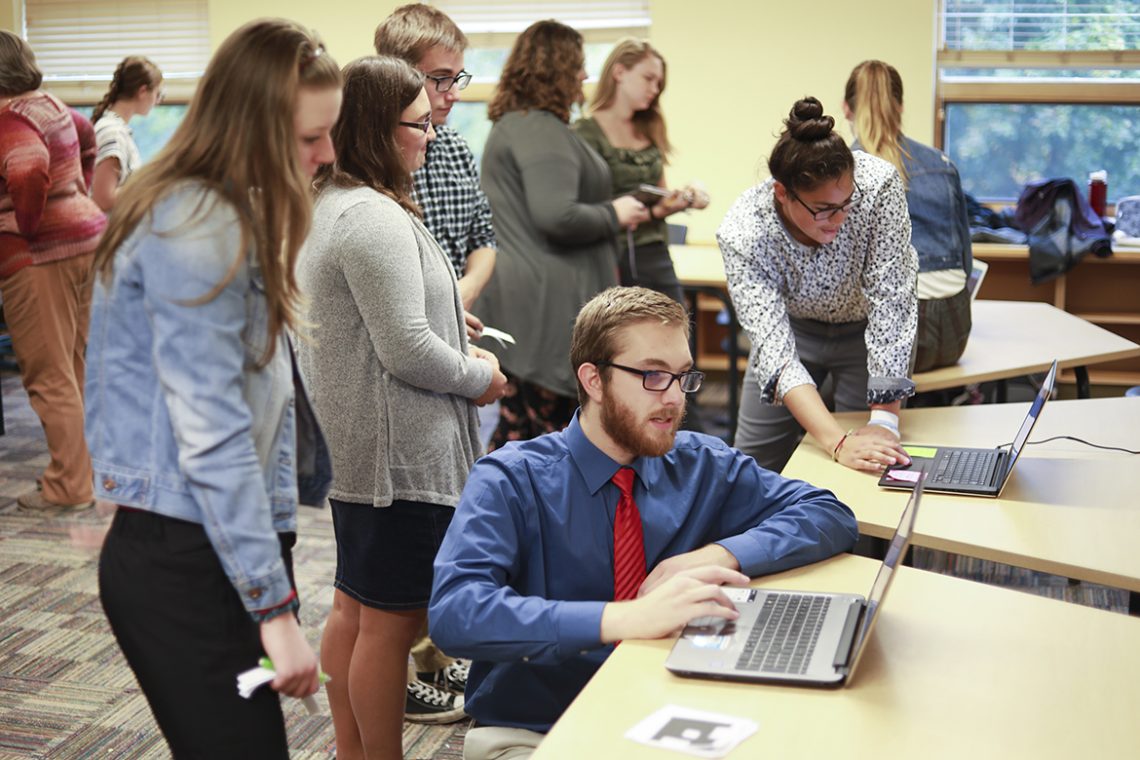
Secondary education–social studies major Tommy Watson ’21 of Presque Isle, Maine, takes peers through his presentation at pre-conference practice session held in the Kalikow Education Center. (Photo by Ryan Mastrangelo.)
Conference attendee Pia Holmes says the presentations by Overall’s students at the ACTEM Conference in Augusta were “nothing less than inspiring.”
“Using readily available applications, the students were able to showcase ways to teach curriculum subjects through technology that would actively engage learners in a multitude of ways,” says the career educator and former principal of Manchester Elementary School and Mt. Vernon Elementary School in Maine’s RSU No. 38. “As future educators, these UMF students will hit the ground running.”
Overall says that although their technology-based learning units were in the early stages of development by the time of the ACTEM conference, her students had insights about what kinds of assessments they wanted to use and identified technologies that would allow middle- and high-school to express their learning and understanding in novel and powerful ways.
Her students, says Overall, “evaluated each technology as to its effectiveness and if that technology was being used in a transformative way. They then designed prototypes of what such a technology-based assessment might look like from a student perspective in order to better evaluate the technology.”
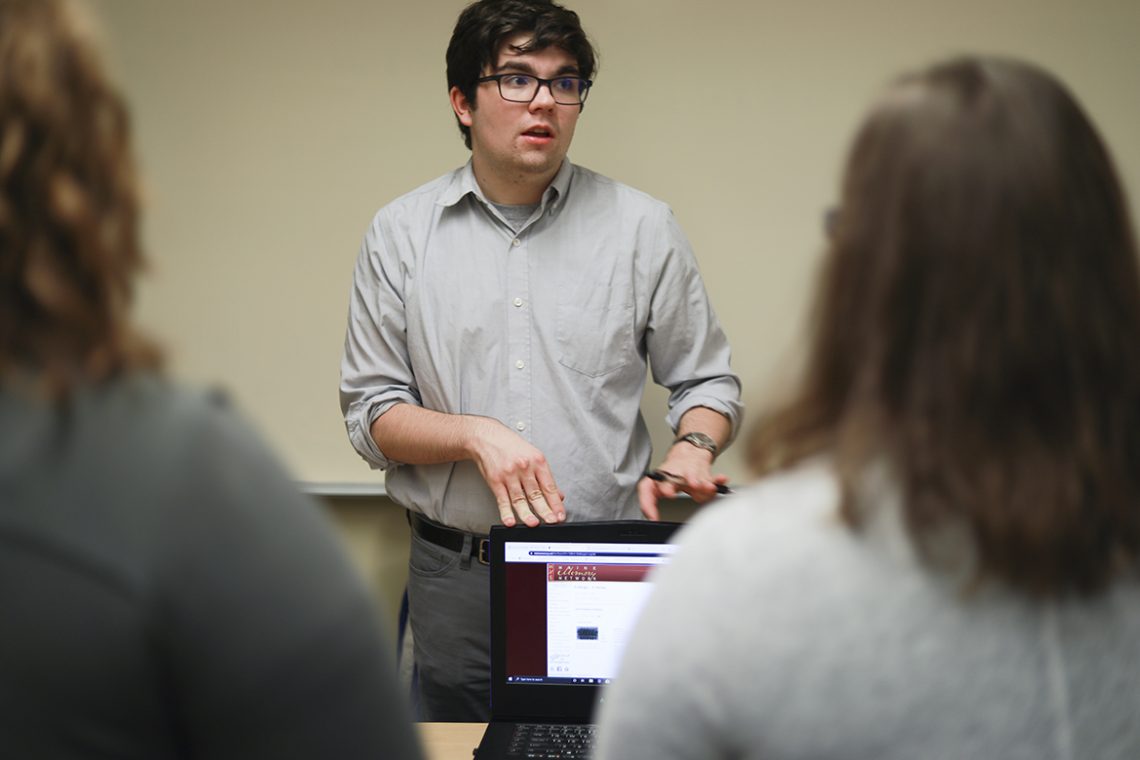
Secondary education–social studies major Neil Nolette ’21 of Dixfield, Maine, stands and delivers at the pre-conference practice session. (Photo by Ryan Mastrangelo.)
Overall says this beta testing of technology-based assessments is a boon to busy educators.
“Today’s classroom teachers often don’t have time to explore educational technology in the way that our students did in class,” says Overall. “As a result of their evaluations, the students had new ideas and perspectives to share with their future colleagues — and the in-service teachers who attended had good input for the students on their units. It was a win-win.”

